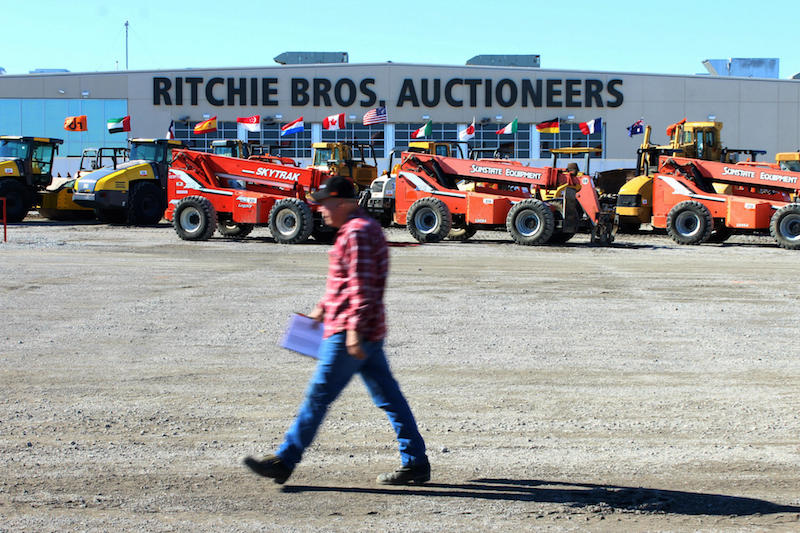This story originally appeared on KERA News.
For most of us, the word “auction” conjures up images of antiques or fine art or even foreclosed houses. Ritchie Bros. in Lake Worth, Texas offers a very different kind of auction – one on the scale of massive earth-moving equipment.
In a lot of ways, auctions are all pretty similar: There are lots up for sale. An auctioneer calls out climbing prices as bidders try to lock in the best deal. Same idea at the Ritchie Bros., just bigger. There were almost 4,000 lots for sale last week at the Lake Worth facility, just one of 40 locations the company runs worldwide.
Some lots were small, tools and truck racks and survey equipment. Others were much, much bigger: Bulldozers, fork lifts, backhoes and cranes. Up for auction were vehicles of various sorts including cars and pickup trucks, semis with all kinds of multi-use and special-purpose trailers for them.
More than 4,000 bidders registered for the two-day auction, most online and many overseas. Chad Johnson, Fort Worth regional manager for Vancouver-based Ritchie Bros., says equipment that has fewer computerized components tend to sell best overseas because it only takes a mechanic to fix it if it breaks. A couple thousand people come through to kick tires and check out products in person.
Two auctions are run simultaneously in two large rooms next door to each other. In one, huge pieces rumble past massive windows for bidders to see. Hands in the audience shoot up. Bid catchers at front use hand signals and eye contact to keep things moving. Final prices are set. A new piece of machinery sold every 30 to 60 seconds, often for tens of thousands of dollars.
Outside, it’s much quieter. Customers walk between hulking machines in neat rows that stretch across the 170-acre lot. Ronnie Lunsford of Springtown brought a long shopping list: Trucks, bulldozers, boring rigs, backhoes.
“Anything that makes money,” he quips.
Lunsford’s business is expanding. He does directional drilling, excavating. A little bit of everything these days, he says, because you have to to stay in business.
Galo Larriva was looking for deals on a truck for his three-man hauling company in Houston, even though things aren’t great right now. The Ecuadoran says he hopes to hand a much bigger company over to his young sons one day.
“Right now the work is bad but let’s hope next year is going to be good,” he said. “That’s why I’m hoping I’m going to get a good deal.”
In another section, bright red semi-trucks, maybe a hundred in all, stand in two long lines. On each, the name Halliburton is painted over. Billy Self from Collinsville says that’s a clear sign of how oil and gas is doing. Self worked on rigs across the country, but now does excavation work because oil jobs are scarce.
“If the oil field wasn’t dead,” he says, “a man would be making a living in every one of these trucks right now, so it’s kind of sad.”
Companies pay another oil business expat, Suzie Farnsworth of Austin, to transport equipment from auctions like this. She came to check out machines for her clients, and drum up business. Yes, she says, the sluggish oil industry is a drag.
“But if you go by my customers, they’re calling me, they’re wanting me to look at things and send them pictures,” she says. “They’re very very interested. So that tells me they’ve got some money in their pocket and a lot of my customers have bought things, and these are things that go to $50, 60, 70,000.”
Over the next couple of weeks this lot will empty out. New equipment will be hauled in, scrubbed down and lined up for the next auction. Thousands of buyers will spend millions of dollars all over again.















